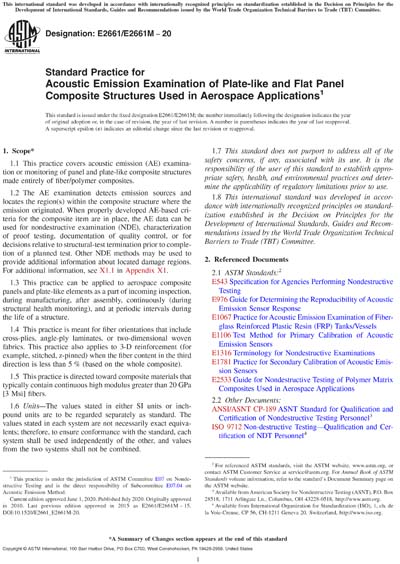Historical
ASTM E2661/E2661M-20
Standard Practice for Acoustic Emission Examination of Plate-like and Flat Panel Composite Structures Used in Aerospace Applications
1.1 This practice covers acoustic emission (AE) examination or monitoring of panel and plate-like composite structures made entirely of fiber/polymer composites.
1.2 The AE examination detects emission sources and locates the region(s) within the composite structure where the emission originated. When properly developed AE-based criteria for the composite item are in place, the AE data can be used for nondestructive examination (NDE), characterization of proof testing, documentation of quality control, or for decisions relative to structural-test termination prior to completion of a planned test. Other NDE methods may be used to provide additional information about located damage regions. For additional information, see X1.1 in Appendix X1.
1.3 This practice can be applied to aerospace composite panels and plate-like elements as a part of incoming inspection, during manufacturing, after assembly, continuously (during structural health monitoring), and at periodic intervals during the life of a structure.
1.4 This practice is meant for fiber orientations that include cross-plies, angle-ply laminates, or two-dimensional woven fabrics. This practice also applies to 3-D reinforcement (for example, stitched, z-pinned) when the fiber content in the third direction is less than 5 % (based on the whole composite).
1.5 This practice is directed toward composite materials that typically contain continuous high modulus greater than 20 GPa [3 Msi] fibers.
1.6 Units—The values stated in either SI units or inch-pound units are to be regarded separately as standard. The values stated in each system are not necessarily exact equivalents; therefore, to ensure conformance with the standard, each system shall be used independently of the other, and values from the two systems shall not be combined.
1.7 This standard does not purport to address all of the safety concerns, if any, associated with its use. It is the responsibility of the user of this standard to establish appropriate safety, health, and environmental practices and determine the applicability of regulatory limitations prior to use.
1.8 This international standard was developed in accordance with internationally recognized principles on standardization established in the Decision on Principles for the Development of International Standards, Guides and Recommendations issued by the World Trade Organization Technical Barriers to Trade (TBT) Committee.
Content Provider
ASTM International [astm]






